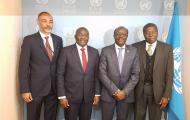Topic Resources
- Hon Vincent Biruta, Minister for Foreign Affairs and International Cooperation of the Republic of Rwanda
Agenda 2063 is Africa’s development blueprint to achieve inclusive and sustainable socio-economic development over a 50-year period.

















